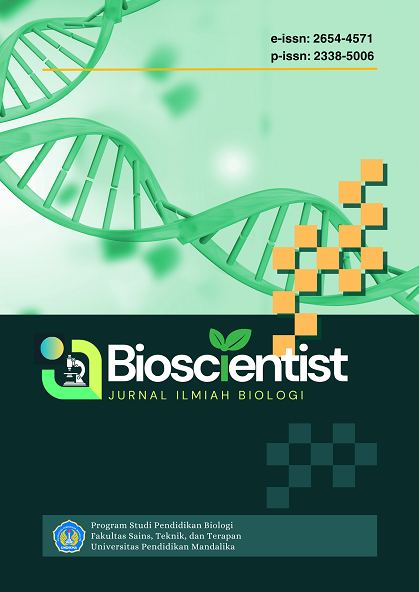In Silico Evaluation of Antioxidant Potential of Adenostemma lavenia Leaf Compounds Against IL-6 in Pulmonary Sepsis
DOI:
https://doi.org/10.33394/bioscientist.v13i3.16396Keywords:
Sepsis, Oxidative stress, Adenostemma lavenia, Antioxidant, Interleukin-6 (IL-6), Molecular docking, In silico studyAbstract
This study aims to evaluate the antioxidant potential of bioactive compounds from Adenostemma lavenia in targeting interleukin-6 (IL-6) associated with pulmonary sepsis. Phytochemicals from Adenostemma lavenia leaves were identified using GC-MS, and ten bioactive compounds with potential antioxidant activity were selected. These compounds underwent further in silico evaluation, including drug-likeness screening, biological activity prediction, pharmacokinetic and toxicity analysis, and molecular docking against interleukin-6 (PDB ID: 8J6F). Among them, stigmasterol showed the highest docking score of –8.1 kcal/mol and a PASS prediction probability (Pa) of 0.867 for antioxidant activity. Half of them fully complied with drug-likeness criteria. Among these, D-Allose, 2,4-Di-tert-butylphenol, and Phytol demonstrated the highest predicted antioxidant activity. Toxicity evaluations revealed a generally safe profile, with minimal nephrotoxicity in two compounds. Notably, Phytol exhibited the closest similarity in binding residues to the native ligand of IL-6, suggesting a strong binding orientation and promising therapeutic value. The in silico findings highlight Phytol and other antioxidant-rich phytoconstituents of A. lavenia as promising agents targeting IL-6, supporting their potential use as adjunct therapies for oxidative stress-related conditions such as pulmonary sepsis. These results contribute to the scientific understanding of natural antioxidants in inflammation control and warrant further validation through in vitro and in vivo studies.
References
Agu, P. C., Afiukwa, C. A., Orji, O. U., Ezeh, E. M., Ofoke, I. H., Ogbu, C. O., Ugwuja, E. I., & Aja, P. M. (2023). Molecular docking as a tool for the discovery of molecular targets of nutraceuticals in diseases management. Scientific Reports, 13(1), 1–18. https://doi.org/10.1038/s41598-023-40160-2
Cepinskas, G., & Wilson, J. X. (2008). Inflammatory response in microvascular endothelium in sepsis: Role of oxidants. Journal of Clinical Biochemistry and Nutrition, 42(3), 175–184. https://doi.org/10.3164/jcbn.2008026
Cerretani, D., Bello, S., Cantatore, S., Fiaschi, A. I., Montefrancesco, G., Neri, M., Pomara, C., Riezzo, I., Fiore, C., Bonsignore, A., Turillazzi, E., & Fineschi, V. (2011). Acute administration of 3,4-methylenedioxymethamphetamine (MDMA) induces oxidative stress, lipoperoxidation and TNFα-mediated apoptosis in rat liver. Pharmacological Research, 64(5), 517–527. https://doi.org/10.1016/j.phrs.2011.08.002
Chen, X., Li, H., Tian, L., Li, Q., Luo, J., & Zhang, Y. (2020). Analysis of the Physicochemical Properties of Acaricides Based on Lipinski’s Rule of Five. Journal of Computational Biology, 27(9), 1397–1406. https://doi.org/10.1089/cmb.2019.0323
Chikhale, R. V., Sinha, S. K., Patil, R. B., Prasad, S. K., Shakya, A., Gurav, N., Prasad, R., Dhaswadikar, S. R., Wanjari, M., & Gurav, S. S. (2021). In-silico investigation of phytochemicals from Asparagus racemosus as plausible antiviral agent in COVID-19. Journal of Biomolecular Structure and Dynamics, 39(14), 5033–5047. https://doi.org/10.1080/07391102.2020.1784289
Goel, R. K., Singh, D., Lagunin, A., & Poroikov, V. (2011). PASS-assisted exploration of new therapeutic potential of natural products. Medicinal Chemistry Research, 20(9), 1509–1514. https://doi.org/10.1007/s00044-010-9398-y
Guarino, M., Perna, B., Cesaro, A. E., Maritati, M., Spampinato, M. D., Contini, C., & De Giorgio, R. (2023). 2023 Update on Sepsis and Septic Shock in Adult Patients: Management in the Emergency Department. Journal of Clinical Medicine, 12(9). https://doi.org/10.3390/jcm12093188
Ho, T. T., Tran, Q. T., & Chai, C. L. (2018). The polypharmacology of natural products. Future Medicinal Chemistry, 10(11), 1361–1368. https://doi.org/10.4155/fmc-2017-0294
Hotmian, E., Suoth, E., Fatimawali, F., & Tallei, T. (2021). ANALISIS GC-MS (GAS CHROMATOGRAPHY - MASS SPECTROMETRY) EKSTRAK METANOL DARI UMBI RUMPUT TEKI (Cyperus rotundus L.). Pharmacon, 10(2), 849. https://doi.org/10.35799/pha.10.2021.34034
Kairys, V., Baranauskiene, L., Kazlauskiene, M., Matulis, D., & Kazlauskas, E. (2019). Binding affinity in drug design: experimental and computational techniques. Expert Opinion on Drug Discovery, 14(8), 755–768. https://doi.org/10.1080/17460441.2019.1623202
Li, J., Fu, A., & Zhang, L. (2019). An Overview of Scoring Functions Used for Protein–Ligand Interactions in Molecular Docking. Interdisciplinary Sciences – Computational Life Sciences, 11(2), 320–328. https://doi.org/10.1007/s12539-019-00327-w
Lipinski, C. A., Lombardo, F., Dominy, B. W., & Feeney, P. J. (2001). Experimental and computational approaches to estimate solubility and permeability in drug discovery and development settings. Advanced Drug Delivery Reviews, 46, 4–17. https://doi.org/10.1016/j.addr.2012.09.019
Maeda, M., Suzuki, M., Fuchino, H., Tanaka, N., Kobayashi, T., Isogai, R., Batubara, I., Iswantini, D., Matsuno, M., Kawahara, N., Koketsu, M., Hamamoto, A., & Takemori, H. (2022). Diversity of Adenostemma lavenia, multi-potential herbs, and its kaurenoic acid composition between Japan and Taiwan. Journal of Natural Medicines, 76(1), 132–143. https://doi.org/10.1007/s11418-021-01565-3
Nurlela, N., Badrunanto, Ilmiawati, A., Nurcholis, W., Takemori, H., & Batubara, I. (2023). The medicinal potential of plants from the Adenostemma genus. Journal of Applied Pharmaceutical Science, 13(8), 1–11. https://doi.org/10.7324/JAPS.2023.95766
Perazella, M. A. (2009). Renal vulnerability to drug toxicity. Clinical Journal of the American Society of Nephrology, 4(7), 1275–1283. https://doi.org/10.2215/CJN.02050309
Protti, Í. F., Rodrigues, D. R., Fonseca, S. K., Alves, R. J., de Oliveira, R. B., & Maltarollo, V. G. (2021). Do Drug-likeness Rules Apply to Oral Prodrugs? ChemMedChem, 16(9), 1446–1456. https://doi.org/10.1002/cmdc.202000805
Shady, N. H., Soltane, R., Maher, S. A., Saber, E. A., Elrehany, M. A., Mostafa, Y. A., Sayed, A. M., & Abdelmohsen, U. R. (2022). Wound Healing and Antioxidant Capabilities of Zizyphus mauritiana Fruits: In-Vitro, In-Vivo, and Molecular Modeling Study. Plants, 11(1392), 1–24.
Sikora, J. P., Karawani, J., & Sobczak, J. (2023). Neutrophils and the Systemic Inflammatory Response Syndrome (SIRS). International Journal of Molecular Sciences, 24(17). https://doi.org/10.3390/ijms241713469
Sudarma, N., & Subhaktiyasa, I. P. G. (2021). Analisis kadar paracetamol pada darah dan serum SIS KADAR PARACETAMOL PADA DARAH DAN SERUM. Bali Medika Jurnal, 8(3), 285–293. https://doi.org/10.36376/bmj.v8i3.177
Wiersinga, W. J., & van der Poll, T. (2022). Immunopathophysiology of human sepsis. EBioMedicine, 86, 104363. https://doi.org/10.1016/j.ebiom.2022.104363
Downloads
Published
How to Cite
Issue
Section
License
Copyright (c) 2025 Wardah Sawitri Polem

This work is licensed under a Creative Commons Attribution-ShareAlike 4.0 International License.













